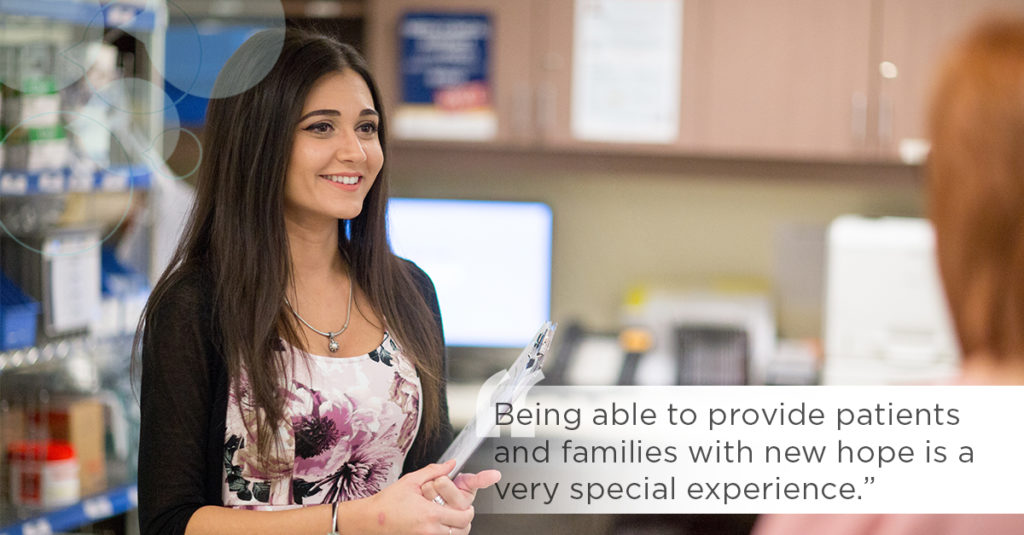
Introducing… a research coordinator
Jelena Popov is a research coordinator through the McMaster Children’s Hospital pediatric gastroenterology clinic, studying the role of fecal transplants in pediatric ulcerative colitis with Dr. Nikhil Pai. Jelena has been a Hamilton Health Sciences research employee since February 2016. She is also a full-time graduate student with the Department of Pediatrics under the supervision of Dr. Elyanne Ratcliffe, where she studies the development of the gastrointestinal system.
What do you love most about your role?
As both, a basic scientist and clinical researcher, I love being able to translate the research I do at the lab bench to clinical settings for my patients and their families. I enjoy working with some of the brightest minds at HHS and being part of a wider, collaborative team with other leading scientists at McMaster and other institutions. Most of all though, I love working with the patients. The nature of my clinical research lets me develop some really deep bonds with the kids in my study. There are no set end-times during our study visits, and the environment is much more relaxed for the kids and their parents. This lets them open up more, and it’s truly special to get to know each child’s personality and funny quirks. From sharing their favorite game cards, to receiving pictures from them at their graduation, these moments are what makes the research so worthwhile, and so meaningful.
The nature of my clinical research lets me develop some really deep bonds with the kids in my study.
What do you find challenging about your role?
The most challenging part about my role is ensuring patients and families are fully aware of the limitations of a clinical trial. Our patients are chronically ill children. Many of the traditional treatments consist of medications that can do a wonderful job, but come with potential side effects. Particularly in a pediatric population, the possibility of some of these side effects is very difficult for parents to accept. This is where patients and families look to us for help. While our research gives them an alternative and instills a deep sense of hope, it’s very important to ensure that they are fully aware of our limitations. Specifically, that we are offering an experimental treatment. As a researcher, I deeply believe in the importance of total transparency with my work and ensuring that families pair their hope with realistic expectations. This can be a very hard thing to do in situations where patients and families feel hopeless and look to us as their last option.
Describe a typical day
I see an enrolled patient first thing in the morning, and our visit can range anywhere from 15 minutes to an hour or more, depending on how quickly we can administer the treatment and answer the patient’s questions. Throughout the day, I visit potential patients in follow-up clinics, inpatient wards, and the endoscopy suites, telling eligible patients and families about the research study and the potential to be enrolled. During this time, I also collect and analyze research data, communicate with the distributors of our investigational drugs, establish plans and support the collaborators at our other two sites, work closely with the HHS Research Ethics Board, and plan upcoming visits for patients. My day ends by generally seeing a few more enrolled patients for their treatment. And amidst this, I’m also working in the lab on my Master’s research.
We become so invested in wanting to see them get better.
Tell us about your most gratifying experience at HHS
The first time I received a thank you card from one of our patients was deeply gratifying. Sometimes in the work we do, it can feel very detached from the people it affects. Clinical research is often so focused on achieving recruitment numbers and carefully monitoring protocols, that you can forget there are people who are impacted by how you speak to them, how you pay attention to them, and empathize with what they’re going through beyond their role as a “participant.” The card wasn’t necessary, but it made me realize I had the capacity to really impact these kids through my work. It gave a lot of purpose to my role and made me feel even more passionate about why I do this work.
Furthermore, our research focuses on patients living with chronic illness. Many times, these patients and families feel like they are running out of treatment options. This is where our research comes in. Being able to provide patients and families with new hope is a very special experience.
What’s one thing people would be surprised to learn about your role?
People would be surprised to know the magnitude of influence our pediatric patients have on us! We become so invested in wanting to see them get better, that sometimes it comes at the expense of spending an extra 10 minutes with them as they do a show-and-tell of their favorite farm animal toys or game cards –each visit there’s a new favorite item to showcase to us! We think about our patients after they leave, when we go home, on weekends – we really care about them. While this is a completely unexpected and hilarious part of the job, I think it really embodies the special bond that develops between us and our research patients over the course of so many study visits.
